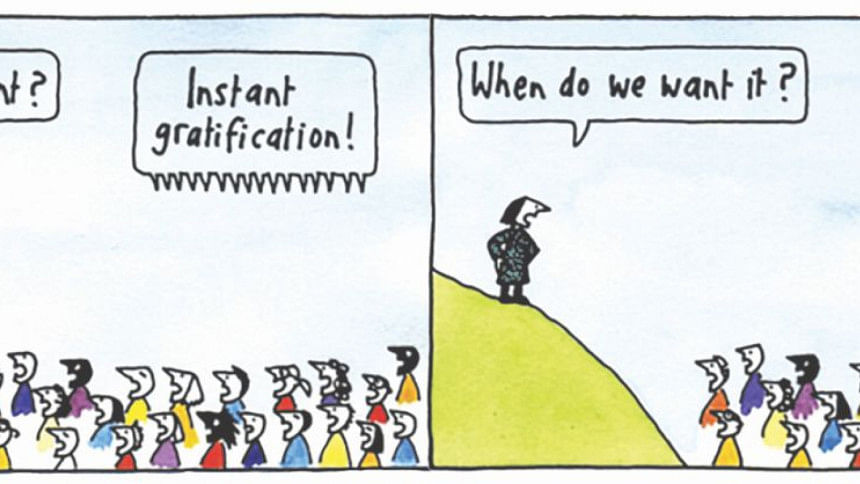The pitfalls of shortcuts

Very recently, I completed a course on acting at a renowned theatre school in Dhaka. I joined the one-year course with a motive to regain 'myself' after being bogged down with depression and anxiety triggered by multiple factors. As days passed, I started to pat myself on the back for making the right choice. However, about six months later, an SMS arrived saying that the authorities had suspended the course as the attendance was thinning; the regular students would be summoned in due time, they told us.
A few months later, the authorities called up and said a new batch had enrolled for a six-month course and we, the previous batch, could join them to finish ours. At the orientation programme, the principal said the duration of the course—which is in its 28th year—was reduced to half because people these days are not willing to attend classes throughout the year, but are instead looking for shortcuts to being screened on television.
There is nothing wrong in wishing to become a celebrity overnight. Who among us does not have such dreams? We have little control over our desires, sure, but as German musician Clara Schumann said, "Why hurry over beautiful things? Why not linger and enjoy them?"
The internet is teeming with articles catering 7-step plans to lose pounds in just a week. There are even courses that people can purchase online to find their true love in 27 days. We also have shortcuts that will supposedly help us discover whether our partners are really into us—"Seven signs that s/he's not just that into you" or "seven signs that s/he's totally into you"! Similarly, there are articles with points that you can check off to determine whether you are a terrible, toxic parent or if your parenting skills are out of this world.
Looking for and taking shortcuts not only deprive us of the sheer joy of learning, but also leaves us with diminished focus, observation and concentration.
When I was a child, I remember the sound of my mother tearing up sheets of paper when writing letters to her brother late at night. She wanted the letters to be flawless, free from spelling errors or overwriting. Most importantly, she would draft them over and over to make sure that the letter carried the genuineness of her affections.
Basically, she wanted to be understood. We all do. That's the main objective of communication. But how many times have you felt content and fully at peace after apologising to someone by text message, or on Facebook Messenger, with a sad emoji? When we hurriedly write 'tc' (take care) to someone in a chat box and shift to another, where a completely different thread of conversation is flowing, do we really show concern for the person?
Apps and e-commerce services that bring restaurant food and even groceries to our doorsteps are great shortcuts. We are often busy and stressed, so meeting our cravings and needs instantly can save us time and effort. However, walking to a nearby shop, inspecting the products, bargaining a little, or even engaging in a simple chat with the shopkeeper may, in fact, release some of the stress.
A friend of mine recently said that he has been busy with a write-up. When I asked him which institution or newspaper/portal he was writing for, his answer was Facebook. Another shortcut! Singers crooning only on YouTube and writers writing solely on Facebook are fine, but wouldn't it be cooler and more rewarding if you showcased your talent on more appropriate platforms and to such an extent that instead of you chasing the world, it becomes the other way round? But that requires practice, time and effort. Not shortcuts.
This tendency towards shortcuts is not limited to our virtual existence; it has crept into most aspects of our lives at a time when the widespread perception is that there is never enough time for the little things that we used to do even a generation ago.
Tamanna Rahman (not her real name), mother of a five-year-old boy who attends a renowned English-medium school in Dhaka, said the school authorities these days charge Tk 200 to laminate textbooks.
Gone are the days when it was a joint task of both parent and child to make covers for new books and copies. Calendar papers or brown papers were reserved for the task. While parents made the covers, children would help by cutting and folding the papers into the right shapes. They would place tapes and very carefully write down their names, roll numbers, subjects and title of the book on the fresh-smelling cover, using their favourite ink and fancy fonts.
But now, the shortcuts save (read omit) the family time that children could have enjoyed with their parents, while also generating some business for a particular sector.
Shortcuts may not be as productive as they seem. They can nurture the wrong habits in us and undermine our true potential. In today's world we see many businesses gladly selling such strategies to those who are looking for magical quick fixes to feel good.
Be it in the professional or personal sphere, the very concept of the shortcut is that you forego the things that may seem insignificant—the warts-and-all discoveries during a relationship, the formative experience of writing something of a standard higher than that required by Facebook's 'post' button, the experience of involving your child in their school responsibilities, etc.— but which are really important in forming who we are. Shortcuts may even meet needs temporarily but in the longer term, the outcomes are not likely to be pleasant for the shortcut seekers.
Promiti Prova Chowdhury is a journalist.

 For all latest news, follow The Daily Star's Google News channel.
For all latest news, follow The Daily Star's Google News channel. 



Comments